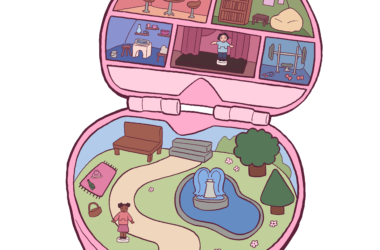For students who have had their hearts set on going to law school since childhood, David Segal's recent New York Times article, "Is Law School a Losing Game?" offered a familiar but oft-ignored warning: Law school is difficult and expensive; proceed with caution.
In his article, chronicling the overwhelming debt and the unforgiving job market faced by an estimated 44,000 hopeful American JDs each year, Segal argues that the decision to pursue a legal degree should not be taken lightly, since, contrary to the statistics being published by the schools themselves, it's an investment that doesn't necessarily offer great returns. Of the 44,000 new graduates each year, only 26,000 find work in the legal field, according to statistics published by the National Association for Law Placement (NALP). The remaining 20,000 have to find a way to pay back their extensive student loans—often up to $250,000—with jobs outside their domain of expertise.
One of these new graduates, Kimber Russell, uses her blog to warn prospective students of the harsh realities of the legal services market in the United States. Both she and Segal point to the graduate employment statistics that schools publish as the source of the problem. These statistics determine school rankings, and thus the amount of funding and the calibre of new prospects they receive. This conflict of interest often results in the statistics' drastic exaggeration. Fourth-tier law schools will report rates of employment at 90 per cent nine months after graduation, counting those who work at McDonald's as well as post-grads working only on the day the survey was taken.
"It's pretty well-known that, for a long time, the statistics they've been putting out are grossly inflated," Russell says of the fourth-tier schools. "[They are] the worst offenders, in my mind."
Fact-fudging is not limited to the less prestigious schools, though. Segal gives the example of Georgetown University in Washington, D.C., which often provides temporary jobs for unemployed recent graduates in the university's admissions office. These positions are typically offered in January and February, which coincides with the nine-month mark, and new hires are then included among the number of Georgetown's statistically employed graduates, boosting the school's ranking.
"What the schools are saying doesn't jive with reality," Russell says. "If you're dropping that much, the law school should be held to a standard … the schools are culpable. It's not all delusion and wishful thinking on the part of the students."
The current situation is the result of a confluence of factors. In 2006, the American Bar Association approved the practice of outsourcing entry-level jobs, while the 2008 recession brought massive layoffs and a surge in all professional school applications by those looking to weather the economic downturn by returning to the ivory tower. In the wake of what Russell calls a "perfect storm," the market for entry-level law jobs is over-saturated, forcing indebted JDs to look elsewhere for employment. It's often necessary for recent grads to start earning money immediately since student loan repayments begin upon graduation and are not dischargeable in bankruptcy, and loan default results in the removal of your legal licence. Russell puts half of her monthly salary toward debt repayment—and considers herself lucky by comparison.
Meanwhile, North of the Border…
The situation in Canada is drastically different, and certainly more promising for prospective students. Much of what ails the American market has been preempted in Canada by an entirely distinct system in which there are both fewer schools and less divergence in terms of academic quality.
"The situation's a lot better in Canada because we have far fewer law schools," says Leeann Beggs, director of career services in the Faculty of Law at Queen's University in Kingston, Ontario. "The likelihood that you're going to get into your profession is very good."
While there are almost 200 American law schools, there are only 20 in Canada, all of which are highly competitive and prestigious. Because they are essentially "all tier one schools," Beggs says, it is very difficult to be admitted, but students can also be assured they will receive a high-quality legal education once they are there. Before passing the bar, law students are expected to article, or work and learn at a law firm in some sort of legal apprenticeship. Furthermore, there seems to be no sort of legal outsourcing being practised in Canada.
"It's pretty tightly controlled who gets access to legal work here," Beggs says.
This is in direct contrast to the hundreds of American law schools, not all of which are accredited—some of which are online—that graduate thousands of new lawyers each year who must then fight for a diminishing number of entry-level jobs. As a result of the Canadian system, recent graduates in this country have a much better chance of gaining the employment they desire. They have already been singled out as the best and the brightest and are competing against a much smaller pool. Some expectations may have to be lowered in terms of starting salaries, says Beggs, but new lawyers should have no problem getting a foot in the door.
The McGill Advantage
The story at McGill is even better, says Catherine Bleau, director of the Career Development Office in the Faculty of Law. McGill Law students receive both the standard Canadian common law degree and a civil law degree, due to the school's "trans-systemic" approach. Because of this unique approach, graduates can practice virtually anywhere they like: bilingual and with both degrees, they have access to markets in Quebec and the rest of Canada, as well as some states in the U.S. They are in such high demand, Bleau says; that about two years before graduating, almost half of the students will have jobs secured through organized recruiting.
Michael Bookman, a law student in his final year at McGill, is headed to a job in New York after graduation.
"What's great about McGill is that it provides you with the access to any legal market you want," he says. "The reach is broader because of the civil law/common law degree in combination with its reputation and its quality."
Nanci Ship, the director of development programs and student affairs at Davies Ward Philips and Vineberg, a law firm with offices in Montreal, New York, and Toronto, said her firm often recruits McGill Law grads.
"I'd have to say that McGill is obviously important to us," says Ship. "We have many alumni that come from McGill … it's an important school that we place a certain amount of emphasis on."
A More Supportive Environment
McGill aside, the Canadian system seems to have avoided some of the problems faced by its American counterpart because it is well regulated. Another important difference between law school in the two countries is the price tag associated with a law degree. Annual tuition alone can be as much as $45,000 in the States, compared to McGill's $3,700 for Quebec residents and $21,000 for international students, according to Bleau. At the University of Toronto, annual tuition sits at around $23,000, but this is on the high end of the scale, as most other schools average around $12,000.
"In Canada, the debt load does not really require you to go work for firms who do the kind of legal practice you don't want to do," Bookman says. "Law students are not forced into that the way they are in the U.S."
Even though the cost is comparatively low in Canada, Bookman was careful to emphasize that this doesn't mean law school is financially accessible to everyone.
"Cost is a factor to everybody … I don't care if you're paying in-province tuition or the international fee. It's a significant investment of time and money."
Another potential benefit of attending a Canadian law school is that the relatively small number of law schools in Canada has fostered a much more supportive environment than in the States. A reciprocity agreement between the schools, in which students can be referred to the career services office of another law school anywhere in the country, is indicative of this.
"We work together a lot," Bleau says. She was recently in contact with someone in the Faculty of Law at Dalhousie University in Halifax. A McGill graduate had been offered a job at a firm in Nova Scotia, and Bleau wanted to make sure the student's starting salary was the standard rate in the province. Career offices collaborate frequently and meet on a yearly basis to discuss the industry, she says.
Recruiting
The recruiting process is similarly well controlled, and overseen by the law school's career development office.
"It's pretty standardized; you know what to expect and when to expect it," Bookman says. After submitting an application, a candidate will be interviewed on-campus and then, during the second round, can be flown out to the firm's offices for another interview.
In what Ship calls "a highly competitive process," during which Davies interviews only 20 to 25 per cent of job applicants, law firms are looking to hire individuals who will fit in well with the firm's philosphy.
"It's not just about getting the best grades but having an interest in the law we do, [as well as] passion for things outside of the law," she says.
The Canadian Market
Although securing a job after graduation is clearly a competitive and comprehensive process, the relatively small number of new lawyers and the well-controlled nature of the industry means that new Canadian JDs have a much better chance of finding work than those in the U.S. While Bookman says fewer recruiters from New York have been coming to McGill lately, McGill graduates are eligible to practice law anywhere in Canada. Rather than go to New York, new JDs can find legal work in Toronto, rural Saskatchewan, or, of course, they can remain in Montreal.
In fact, Ship says, the job market in Montreal at the entry level is stable. The legal services market in Quebec has weathered the 2008 recession well; Davies' entry-level hiring has been roughly the same over the last few years.
Once hired, the career path for a young lawyer "is pretty much standard in Quebec," Ship says. After being hired for a six month stage, the next step is to become a first-year lawyer, then a second-year lawyer, moving up the ranks and becoming eligible for partnership after the fourth year at the firm. While the workload of these young lawyers involves the typical litigation and document review that Russell describes as "tedious," but Ship calls "critical to the heart of what we're doing [at Davies]," their relative inexperience doesn't limit them to very basic legal work.
"I was very impressed by the level of development that was given to young lawyers at Davies (as compared to my prior experience as a lawyer in New York City) … Yes you're always supervised, but for every due diligence and document review, there's another frontline opportunity as well," Ship says, citing the example of one student's involvement in the drafting of a brief deposed before the Supreme Court during that student's first summer with the firm."
To Go or Not to Go?
It appears that unlike the situation in the U.S., life after law school isn't so bad in Canada. However, the Canadian experts agree that despite their differences, there remains one theme common to both the American and Canadian fields of legal education: the decision to go to law school should not be taken lightly, and it should not be the default destination for Arts students.
"Its fine to come to law school by curiosity, to save the world … but it's still a big decision, [involving] more than three years in school, and you have to justify why you did it," Bleau says, adding that graduates may realize they aren't "turned on by mergers and acquisitions."
Russell says that an undergraduate in political science, the typical applicant to law school, will find that the field of their undergraduate study has "absolutely nothing to do with law school."
Some of Bookman's peers have opted to find work at big consulting firms because the skills accrued at law school—problem-solving, writing, advocacy—are useful and transferable to careers in industries like government and business. Furthermore, he says, there is mobility across legal jurisdictions. However, Bookman urges prospective law students not to base their interest off how they have seen lawyers portrayed on films and television.
"I wouldn't expect anybody to take any of these choices lightly," he says, maintaining that it is important to inform yourself ahead of time of the costs involved with a law degree and what kind of work a lawyer does. "Personally, I very much benefitted from working in a different professional environment and seeing what lawyers were doing … and making the conscious choice to pursue that."
As Segal writes in his article, "Law school is a pie-eating contest where the first prize is more pie."
So before making the decision to go to law school, you had better make sure you like pie.








wow